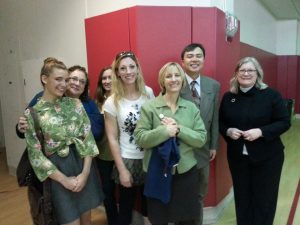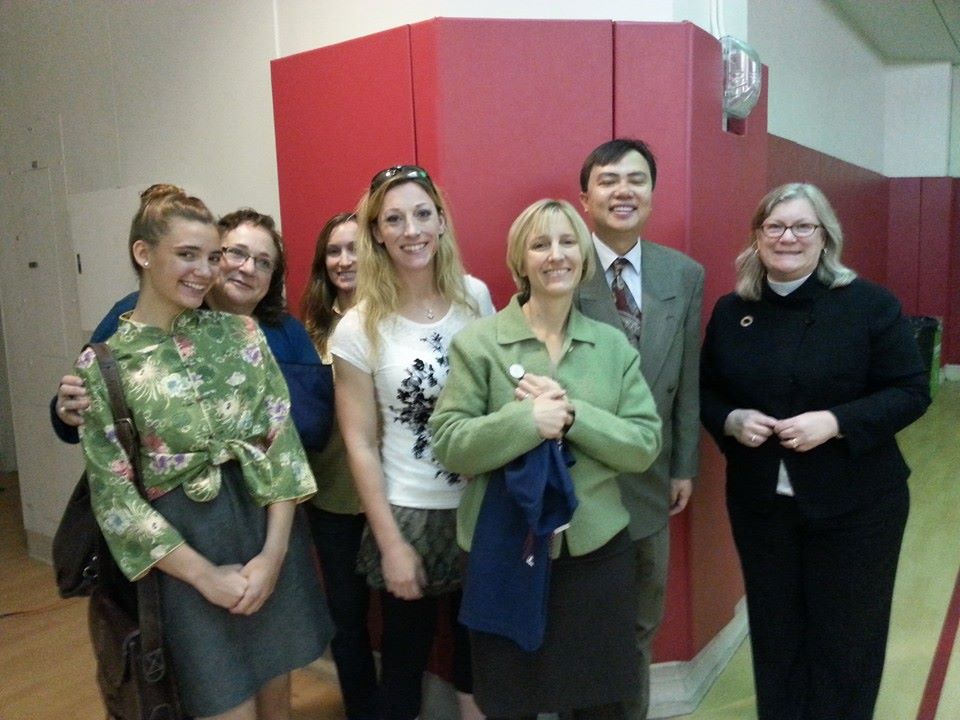Sarah Lawton Honored with House of Deputies Medal

Lawton (center) and Jennings (right) with family and friends who surprised Lawton at the convention: (l-r) Hannah van Aelstyn, Harriet Schiffer Scott, Monica Ball, Rachel Lawton and Dominic Chan.
Photo credit: Richard Leslie Smith
Members of Generation X are frequently portrayed as too cynical to commit themselves to creating institutional change. But the description doesn’t fit Deputy Sarah Lawton of the Diocese of California.
“There’s work for all of us to do in the public square,” says Lawton, who was awarded the House of Deputies medal on October 26 by President Gay Clark Jennings.
In presenting the award at the diocese’s convention at Grace Cathedral, Jennings praised Lawton for her commitment to the social justice work of General Convention and emphasized the importance of advocacy in today’s church.
“I think that we are called, now more than ever, to work for Gospel justice and raise our voices for those who have no voice,” Jennings told the delegates. “The imperative to proclaim generous Christianity is greater now than it has ever been in my lifetime.”
Lawton, a second-generation deputy who served in 2006, 2009 and 2012, was elected at the convention to serve again in 2015. She shares Jennings’ long view. “We stand on the shoulders of Anglicans like William Wilberforce and Frances Perkins,” she says. “There’s no way we finish the work in our generation. We do our part.”
Both as a deputy and in her job as development coordinator for the University of California Berkeley’s Labor Center, Lawton draws particular inspiration from Perkins, President Franklin D. Roosevelt’s secretary of labor. A faithful Episcopalian, Perkins is reported to have written the Social Security Act sitting in the rectory of St. James Episcopal Church on Capitol Hill, where she was a member. “She lifted generations of elders out of poverty,” Lawton says. “It was an Episcopalian who pushed FDR to do that. She believed in the social gospel.”
Lawton shares that conviction and believes legislation passed by General Convention is among the best ways to put faith into action. “We listen to each other and learn from each other, and I think General Convention resolutions incorporate the voices we hear and the minority opinions,” says Lawton of her experience as secretary of the National and International Concerns legislative committee in 2012. “I learned a lot about how important the process is from my fellow deputy Russ Randle, who chaired the committee. It takes work and time for deputies to meet. It couldn’t just be done by a committee in New York. As large and unwieldy as the House of Deputies can be, there’s something that would be lost if we didn’t have it.”
Between General Convention’s triennial meetings, Lawton finds its resolutions invaluable. She and other deputies from California used Resolution D059 of the 2012 General Convention as leverage in persuading state authorities to stop law enforcement practices that discourage undocumented immigrants from reporting crimes. “We arrived home from General Convention waving the resolution and were able to hold an ecumenical and interfaith rally on the steps of Grace Cathedral to raise a religious voice’” she says. “It takes a lot of advocacy to accomplish this kind of change, but the religious voice reminds us that we are all one community, and it was essential to our success.”
Bolstered by resolutions from the 2006 and 2012 General Conventions, the Episcopal Church was also able to play a role in the legal struggle that led to the Supreme Court’s decision to overturn the federal Defense of Marriage Act (DOMA). Twenty-six bishops cited the resolution, which called for federal, state and local governments to adopt legal protections for same-sex couples, in asking the Court to find DOMA unconstitutional.
She cautions, however, against hoping for quick fixes. “If you think we’re going to solve things with one resolution, don’t. You can’t think of it as doing all the work. Think of it as being part of the cloud of witnesses.”
As she prepares to celebrate All Saints Day at the baptism of a new niece, Lawton says she is especially aware of those who have gone before. Her mother, Nancy Lawton, was an advocate and a deputy from whom Sarah learned her commitment to justice and to the Episcopal Church. Nancy and Sarah’s father, the Rev. Jack Lawton, were killed in a car accident a few days after the 1991 General Convention in Phoenix.
“My mother organized Jonathan Myrick Daniels to go to Selma in 1965 and at her last convention, in 1991, was the first reading of the resolution that added him to the calendar of commemorations. In my last conversation with my mother, she was so proud of that milestone.”
“Over the great span of time, the people who do this work will bring about the reign of God, the Beloved Community,” she says. “That’s the vision that we seek in our congregations and in the Episcopal Church. The other six days, we’re out making it real in the Monday-Saturday world.”


